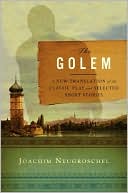

 |

|

The average rating for The Golem: A New Translation of the Classic Play and Selected Short Stories based on 2 reviews is 4.5 stars.
Review # 1 was written on 2016-06-27 00:00:00 Diana Pierce Diana PierceThe golem and his creator, Rabbi Leyb, appear here in four different stories/story collections by four authors. The first, by Yudl Rosenberg, appearing first in 1904, is a collection of very short tales titled "The Golem or The Miraculous Deeds of Rabbi Leyb." The editor describes the stories as "pulp fiction" or "grade-B gothic," which seems a bit harsh, but the stories are stylistically pretty rough. They have a sort of folk tale feel to them, and in most of them, the brilliant Rabbi Leyb protects the Jews of Prague from destruction with the assistance of his obedient golem, often as a result of the blood libel, and often involving the machinations of the evil Christian priest, Tadeush. The second section, which is very short, is by S. Bastomski, published in 1923. The first part, "The Jewish Ghetto," talks about... the Jewish ghetto. The second tells about the clever Rabbi Leyb, and his interactions with the King on behalf of the Jewish residents. We learn about the admiration of Christian scholars far and wide (including Tycho Brahe!) for the brilliant rabbi, and, in a fairy tale-like interlude, of the magical transformation of the rabbi's modest home when the king and his courtiers come for a visit, including the appearance of a fabulous banquet. Somewhat incongruously, we also get the story of how the rabbi created the golem as a manual laborer, but then forgot to turn him off one Sabbath, with the result (we never find out why) that the golem smashes everything in the rabbi's house and yard. The rabbi, having learned his lesson, never activates the golem again. The third section, "The Golem," by Dovid Frishman, published in 1922, feels more like a typical short story than any of the others. Well, "typical" is hardly right. In it, Rabbi Leyb, apparently as a diversion during the twenty-eight years he spends in isolation while studying the "great mystery," creates the golem to be the ultimate student. The rabbi's granddaughter, Eve, finds the golem one day, while cleaning her grandfather's study, and falls passionately (and I mean passionately!) in love. For the rest of the story the poor golem is pulled back and forth between the intellectual rabbi and his lusty granddaughter, agonizing between a life of religious study or sensual pleasures (never minding that, what with having a wife and granddaughter, the rabbi obviously didn't see this as an "either/or" for himself. "What's sauce for the goose..."). The fourth section, the play, "The Golem," by H. Leivick, is the longest in the book and is... really pretty bizarre. I hardly know how to describe it. A hallucinogenic house of horrors. A psychedelic Jewish rock opera. Rabbi Leyb appears as a sort of Dr. Frankenstein, with the golem as his despairing, lonely monster. Their drama, in which a demanding creator is unwilling to respond to the needs of the creature he created merely as a tool, is perhaps just another tragedy in the smoke and terror filled city of Prague, but eventually their dysfunctional relationship becomes a direct cause of tragedy. There were a number of scenes which might have been dreams, but I wasn't quite sure, and a battered young man who is a Jewish messiah figure, probably. Well, actually, at one point, the golem, the Jewish beggar/messiah, and Jesus are all sitting inside a circle on the floor of a cave, the second two having narrowly avoided being tricked by the golem into drinking from a bottle of blood (complements of the evil priest we met in one of Rosenberg's stories back at the beginning of the book), while a troupe of cave spirits dance around them, singing. Like I said, this is trippy stuff. So we might be pretty confident we have a couple messiahs, but then it turns out that this part may have all been a dream. Plus, the rabbi drives the messiah(?)/beggar out of town, which seems... odd. Lots of fear, loneliness, and sorrow, mysticism and madness. As with some of the earlier stories in the book, the rabbi is eventually forced to recognize his error in creating the golem, in this case with a pacifist conclusion. The editor, Joachim Neugroschel, has done a wonderful job of arranging the stories, beginning with the simple and straightforward and ending with the complicated and confusing. If I'd jumped straight into Leivick's play I'd have been completely lost, but building on the background provided by the stories of Rosenberg and Bastomski I had at least a sporting chance. Not that I didn't get fairly muddled at points in Leivick's work anyway. I give this 3 ½ stars, but am rounding up to 4 because it's memorably quirky and if I were a better reader I'd likely have gotten more out of Leivick's piece. |
Review # 2 was written on 2014-04-16 00:00:00 Eric Meade Eric MeadeThe play is so incredibly macabre and dark, it's beautiful. The stunning plot and the words used were so spine-tinging and scary. An incredible play! The stories were really interesting, too. But the play was the one to die for. It was writing in Shakespearean format, so the actors had to memorize INCREDIBLY long, beautiful, poetic lines. I just loved it so much! |
CAN'T FIND WHAT YOU'RE LOOKING FOR? CLICK HERE!!!